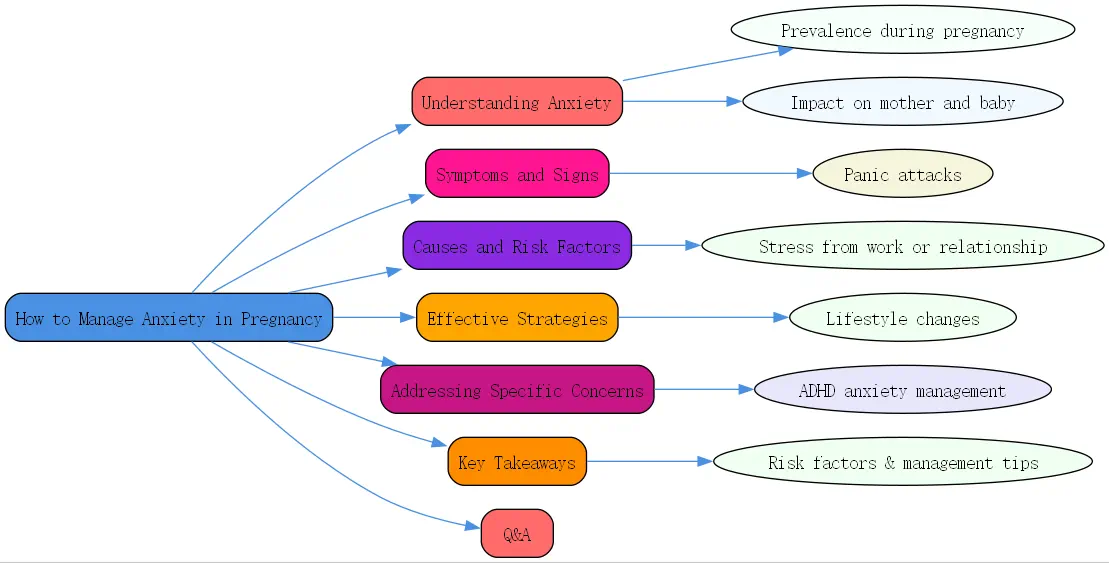Understanding Anxiety During Pregnancy

Pregnancy is a transformative, exciting experience閳ユ攤ut it’s not uncommon for expectant mothers to experience anxiety. While occasional worry is a normal part of pregnancy, some women face persistent feelings of unease, also known as antenatal anxiety. Knowing how to manage anxiety in pregnancy is essential for your well-being and your baby’s health.

Normal Worries vs. Antenatal Anxiety: Recognizing the Difference
Many pregnant women worry about their baby’s health, their ability to be a good parent, or how life will change after delivery. These concerns are natural and often fueled by the emotional and physical changes pregnancy brings, including fluctuating hormones. Antenatal anxiety, on the other hand, goes beyond occasional concerns. If anxiety becomes overwhelming or interferes with daily functioning, it may indicate an anxiety disorder. Untreated, this condition can negatively impact both the mother and baby’s health, highlighting the importance of seeking help.
Prevalence of Anxiety During Pregnancy
Antenatal anxiety is far more common than most people realize. Statistics show that over one in ten women experience some form of anxiety during pregnancy. Understanding this prevalence helps normalize the experience and encourages women facing severe symptoms to seek intervention without fear of judgment.
Impact of Untreated Anxiety on Mother and Baby
It’s crucial to manage anxiety during pregnancy because persistent, untreated anxiety increases the risks of preterm labor, low birth weight, and potential developmental challenges in the baby. Emotional distress can amplify physical strain, making it harder to maintain a healthy pregnancy. Ensuring mental health is cared for during pregnancy has profound benefits for both mother and child.
Symptoms and Signs of Anxiety in Pregnancy
Being able to recognize the signs and symptoms of anxiety is a vital step toward seeking help and implementing coping strategies.
Emotional Symptoms: Nervousness, Worry, Irritability
Common emotional symptoms of anxiety during pregnancy include feeling persistently nervous, worrying about your baby’s health excessively, or experiencing irritation with minor inconveniences. These responses are often amplified by hormonal changes, which can intensify your emotional reactions.
Physical Symptoms: Rapid Heartbeat, Shortness of Breath, Dizziness
Anxiety doesn’t just affect your mind; it also impacts your body. Physical symptoms during pregnancy might include dizziness, muscle tension, rapid heartbeat, shortness of breath, and even trembling. If you notice these symptoms regularly, it’s essential to consult a medical professional.
Panic Attacks During Pregnancy
In some cases, anxiety may escalate into sudden episodes of extreme distress known as panic attacks. Pregnant women experiencing panic attacks might notice severe physical sensations such as chest tightness or difficulty breathing. These episodes can feel overwhelming, particularly if centered around fears related to the baby’s health.
The Impact of Health Concerns on Amplified Anxiety
Concerns about your baby’s well-being or complications during pregnancy can amplify symptoms of anxiety. These fears often create a cycle of heightened stress, making physical and emotional symptoms worse. Learning effective tips to manage anxiety and stress can help break this cycle and create a positive, nurturing environment for both mother and baby.
Causes and Risk Factors for Anxiety in Pregnancy
Various factors contribute to the risk of developing antenatal anxiety. Understanding these causes can offer insights and guide you toward appropriate solutions.
Prior History of Anxiety, Panic Attacks, or Depression
A personal history of anxiety, panic disorders, or depression significantly increases the risk of antenatal anxiety during pregnancy. Women who struggled with anxiety before conception may find the hormonal and lifestyle changes of pregnancy intensify these existing challenges.
Family History of Mood Disorders
A family history of mood disorders or panic attacks can also predispose individuals to experience anxiety during pregnancy. Having parents or siblings with anxiety-related conditions may increase emotional vulnerability during this critical phase.
Previous Pregnancy Loss or Fertility Struggles
Pregnant women who have experienced miscarriage, stillbirth, or fertility challenges often grapple with heightened fears during subsequent pregnancies. These experiences can lead to excessive worry about the pregnancy’s outcome, contributing to antenatal anxiety.
Stress from Work, Home Life, or Relationship Issues
External stressors閳ユ敃uch as busy work schedules, financial strain, or relationship conflicts閳ユ攦an compound the emotional pressure of pregnancy. Issues such as lack of partner support and domestic violence are particularly concerning and should be addressed with professional intervention immediately.
Effective Strategies: Tips to Manage Anxiety and Stress
Finding actionable ways to manage your anxiety is an essential part of protecting your mental health and preparing for motherhood. A combination of professional help and lifestyle adjustments can create lasting positive effects.
Seeking Professional Help for Anxiety
Counseling and Therapy
Therapeutic services such as Cognitive Behavioral Therapy (CBT) and interpersonal psychotherapy are proven methods for managing anxiety during pregnancy. These treatments focus on identifying triggers and nurturing coping mechanisms to alleviate distress effectively. Your doctor can recommend the best option for your needs.
Support Groups: Sharing Experiences and Gaining Insight
Joining support groups with other expectant mothers can provide validation and practical advice. Discussing shared concerns in a community setting can ease feelings of isolation and help participants build confidence in navigating challenges.
Medication: Benefits, Risks, and Safe Usage During Pregnancy
In severe cases of anxiety, medication may be necessary to protect both the mother’s and baby’s health. Always consult your healthcare provider before starting or discontinuing any medication during pregnancy. Together, you’ll review the safest options available.
When to Contact Your Doctor
It’s important to talk to your doctor as soon as anxiety begins interfering with daily life or if panic attacks occur frequently. They have the expertise to properly diagnose your condition and recommend tailored treatments.
Lifestyle Changes to Reduce Anxiety
Exercise: Safe Physical Activity During Pregnancy
Regular exercise can relieve symptoms of anxiety by boosting serotonin and regulating stress hormones. Activities like prenatal yoga or walking are great ways to stay active safely during pregnancy.
Healthy Eating: A Balanced Diet for Mood Stabilization
A nutrient-rich diet filled with protein, fiber, and healthy fats can improve overall mental health. Consult a dietitian to develop a personalized eating plan that minimizes stress and supports your pregnancy.
Getting Enough Sleep: Establishing a Consistent Sleep Routine
Good sleep hygiene is essential for reducing stress and managing pregnancy-related anxiety. Aim for a consistent bedtime routine to help your body and mind recharge.
Meditation and Breathing Exercises for Relaxation
Practicing mindful breathing or meditation for 20閳?0 minutes daily can be a powerful way to calm your mind. These methods replenish oxygen levels, regulate the nervous system, and reduce physical tension.
Addressing Specific Anxiety Concerns
Pregnancy can amplify pre-existing mental health challenges. Here’s how to navigate PMS and ADHD-related anxiety during this time:

How to Manage PMS Anxiety During Pregnancy
Hormonal changes during pregnancy may overlap with PMS-like symptoms, leading to excessive irritability and worry. To manage PMS anxiety, focus on self-care strategies, such as stress reduction techniques and proper hydration. Regular communication with your doctor can help identify triggers and address them effectively.

Managing ADHD and Anxiety During Pregnancy
Pregnancy presents unique challenges for women with ADHD, especially concerning medication management. Women should work closely with healthcare providers to evaluate treatment options and consider non-pharmacological strategies like mindfulness exercises, time management tools, and organizational support to manage anxiety and ADHD symptoms.
Bullet Point Takeaways
- Antenatal anxiety affects over 1 in 10 women; recognizing symptoms and seeking help is crucial.
- Emotional and physical signs of anxiety include nervousness, difficulty sleeping, rapid heartbeat, and dizziness.
- Risk factors include prior mental health conditions, relationship stress, and pregnancy loss.
- Tips to manage anxiety and stress include therapy, exercise, meditation, and proper nutrition.
- Consult your doctor when anxiety interferes with daily life or escalates into panic attacks.
Q&A Section
What Are Some Natural Ways to Manage Anxiety During Pregnancy?
Natural methods include daily mindfulness activities like meditation, breathing exercises, and prenatal yoga. Cultivating a consistent sleep schedule and eating foods rich in protein, omega-3s, and vitamins can also stabilize mood. Additionally, reaching out to support groups or attending counseling sessions can provide emotional validation and actionable insights for managing anxiety naturally.




